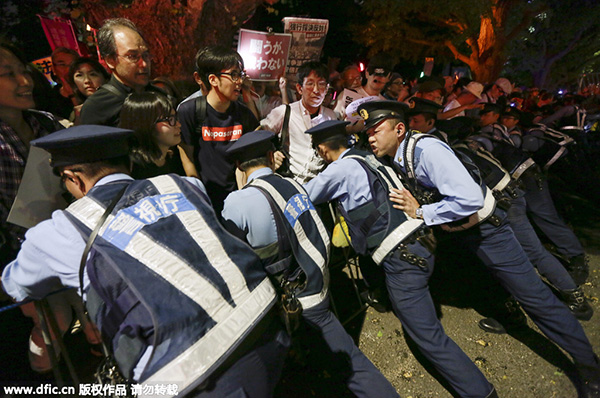Japan's moves threaten regional peace and stability
Updated: 2016-03-30 07:32
(China Daily)
|
|||||||||
 |
|
Japanese policemen contain protesters as they demonstrate against Japan's controversial national security bills in front of Japan's parliament building in Tokyo, Japan, Sept 14, 2015. [Photo/IC] |
On Monday, a radar station on Japan's Yonaguni Island manned by about 160 Self-Defense Forces personnel came into service, about 150 kilometers from the Diaoyu Islands.
On Tuesday, Japan's controversial new national security laws, which allow the SDF to engage in combat overseas and exercise "collective self-defense", took effect. They are said to be indispensable for a more "proactive" Japan aspiring for greater contributions to global "peace and security".
In theory, and in the official rhetoric, neither move is targeted specifically at China.
But it would be dangerous to look aside from the game-changing potential of such moves, as well as the direct threat they represent to China.
Militarization of the southwestern-most island of Japan is only the beginning of a wider military build-up along the Japanese island chain. Even without the "in-private" murmurs heard in Tokyo, everybody knows this is being done with China in mind.
And there seems no way to change it.
Over 90 percent of constitutional experts in Japan believe the new laws are unconstitutional. Numerous polls in Japan have shown the majority of Japanese people oppose them. The public has protested. So have neighboring countries. Yet the laws survived parliamentary scrutiny.
With Shinzo Abe's ruling coalition holding a commanding majority in both houses of the Diet, the demise of the war-renouncing Article 9 of the Japanese Constitution seems to be just a matter of time and procedure.
Worrisome changes will ensue; including in the South China Sea, where Tokyo has been tirelessly fanning the flames between disputing parties. Sending SDF vessels to patrol there will mean readiness to confront China on a broader front.
Beijing has expressed the hope that Tokyo will "do more that facilitates regional peace and stability, instead of the opposite". Tokyo is doing exactly the opposite.
With Abe trying desperately to put the South China Sea issue on the table of the upcoming G7 summit, Beijing should not let the vain hope for "friendship" get in its way of coping with a now-very-different Japan. A Japan determined to be the US' foremost pawn in the containment of China. A Japan that seems prepared for long-term confrontation with China.
Talks with Tokyo are fine, as long as they are conducive to preventing or managing a crisis. But our policies should always be grounded in what is happening, not what we wish would happen.
The truth is China-Japan relations have just reached a watershed, and they are entering an era brimming with uncertainties.
Related Stories
Japan's security laws come into effect as public protests erupt 2016-03-29 12:24
Largest opposition party formed in Japan 2016-03-29 08:14
ROK and Japan stay 'muted' on Trump 2016-03-29 08:14
China urges Japan to do more for regional peace and stability 2016-03-28 19:48
Today's Top News
China, Czech Republic set up strategic partnership
EgyptAir hijacker arrested, all passengers freed
Panda to join Little Mole in new cartoon series
President optimistic for Sino-German cooperation
Info sharing 'is key' as Europe faces terror threat
Uneasy times as Belgium mourns the dead
Belgian bombing suspect still at large: Prosecutor
Belgian media withdraws reports of suspect's arrest
Hot Topics
Lunar probe , China growth forecasts, Emission rules get tougher, China seen through 'colored lens', International board,
Editor's Picks

|

|

|

|

|

|






